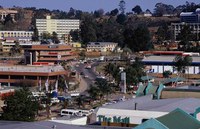Police Arrest Swazi Protest Leaders on Anniversary of Constitution
Security forces in Swaziland have begun a clampdown on pro-democracy demonstrations marking the anniversary of the Swazi Constitution.
Leaders of the Trade Union Congress of Swaziland (TUCOSWA), one of the main organisers of the demonstrations, are reported to have been arrested on Thursday 12 April 2012 at Coronation Park in the Swazi capital city, Mbabane.
A source linked to the group’s leadership said it’s unclear how many people have been detained because police confiscated cellphones but estimated the figure as being in the hundreds.
Barnabas Dlamini, the Swazi Prime Minister, announced a ban on all protests, after claiming they were deemed by the courts to be illegal. It is not clear on what basis the court orders were granted.
Dlamini said in a statement national security services had been instructed to deal with the protests.
In a separate statement Percy Simelane, the official government spokesperson, said, 'We shall deal with all those who will want to defy the law. The Industrial Court stopped any form of protests and we therefore do not expect any protest.'
He told journalists, 'We can promise them now that those who will attempt to defy the ruling will be dealt with harshly.'
The Swazi government also deregistered TUCOSWA. The government said its registration process was flawed, despite being approved in January. TUCOSWA has threatened to boycott the 2013 elections, demanding direct representation, universal suffrage and institutions that uphold political rights.
TUCOSWA was formed recently from a merger of the influential Swaziland Federation of Trade Unions, the Swaziland Federation of Labour and the Swaziland National Association of Teachers.
The Daily Maverick reports that Vincent Dlamini from TUCOSWA explained the current protests: “There are no checks and balances in our current system. The king appoints and fires whoever he wants and the people have no say. We would prefer a system where the monarch is a ceremonial figurehead and an elected prime minister would wield the real power.”

